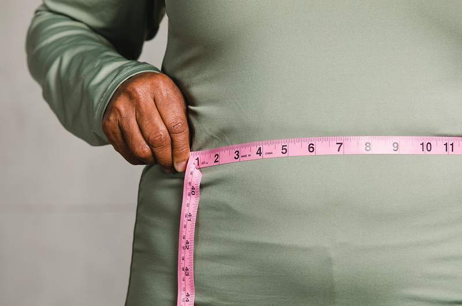What is the key to successful weight loss?
- Aug 11, 2021
- 4 min read
Updated: Jan 17, 2025
Why are some people able to lose weight more effectively than others, and, even more importantly, keep it off! Surprisingly for some, the answer to this question lies not in the type of dietary pattern chosen to lose weight but in the willingness to self-monitor one’s progress. So, what is self-monitoring and what does the research tell us about how successful it is for weight loss…
What is self-monitoring?
All successful weight loss methods include an element of self-monitoring. Self-monitoring is about tracking behaviours and/or metrics (weight, waist circumference, blood pressure etc) to increase self-awareness about how these behaviours influence weight (1). It is the first step towards self-regulation and instigation of new, healthier habits that can lead to weight loss. To be effective self-monitoring must be accompanied by a belief that positive changes in health behaviours can be achieved (2).
What should you monitor?
Obvious things to monitor are the metrics mentioned above. These are generally easy to do as long as you have the correct measuring apparatus such as scales, tape-measure and blood pressure monitor.
Regularly monitoring these metrics enables you to see your progress over time and provides encouragement to continue your new diet and habits. It also enables you to identify when weight loss has stalled and gives you the opportunity to work out why this might be and what steps you might need to take next to start losing weight again.
It is quite common and normal for weight loss to stall for a while, maybe you’ve slipped into some bad habits again or got a bit complacent, or maybe you just need a booster such as introducing some intermittent fasting to get things going again.
Another type of self-monitoring that can be very useful for people who have unusual behaviours around food such as eating when not hungry, comfort eating, binge eating, eating until uncomfortably full or getting up at night to eat, is to keep a food journal.
In the journal you document the foods you have been eating that day and how you were feeling at the time you ate it, your hunger levels, your energy levels and basically the ups and downs you felt around food during the day. The idea is to make associations between food, mood and behaviour and to work out what your triggers are for good or bad eating habits.
Only when you understand yourself better can you take steps to correct your behaviour by linking a trigger event to a more positive behaviour response. So, for example, if having a stressful phone call with someone triggers you to go and eat biscuits then change your response to something else that makes you feel good, such as taking a bath or walking around your garden or doing some deep breathing.
This will then become a new habit that you indulge yourself with whenever you’ve had a stressful phone call, instead of eating biscuits!
How often should you self-monitor?
Virtually all the research points to frequent and consistent self-monitoring to achieve the most weight loss and for weight loss maintenance. In fact, the more frequently and more consistently people monitor themselves the better the weight loss results! (3). However, for many people enthusiasm for self-monitoring diminishes overtime and unfortunately so does the weight loss (4).
When it comes to weighing oneself, much of the research is pointing to daily weighing as being the best strategy (5). It is believed that daily weighing leads to a greater adaptation of weight control behaviours (diet, activity, sleep, stress management etc).
People who weighed themselves daily had more weight loss than those who weighed themselves five times a week, who, in turn, did better than those who weighed less frequently than that. Daily weighing also allows you to respond to any weight gain before it becomes too much to manage as it encourages a high degree of vigilance (6).
Conclusion
It is clear from the research that self-monitoring is an essential component of any weight loss programme. It encourages self-awareness, self-exploration, marks progress, enables ‘course corrections’ to be made and acts as a reward system when you see the pounds and inches disappearing!
It also helps to reinforce good behaviours, allows self-correction of bad ones and helps with establishing new good habits. Remember though that self-monitoring is not a passive academic exercise for collecting data, it is an active exploration into your own eating behaviours, finding your triggers and is a way of helping you to identify solutions to your unique problems.
A final word! Everyday you will have small successes (or even big ones). Notice and savour these victories, however small (you resisted the biscuit, you had an egg for breakfast, you went for a walk instead of eating the chocolate bar) – celebrate these successes, give yourself a high-five, a thumbs up or a ‘yay’, you deserve it.
References
1. Burke, L; wang, J; Sevick, M (2011), ‘Self-Monitoring in Weight Loss: A Systematic Review of the Literature’, J.Am.Diet Assoc., 111 (1), 92-102
2. Yu, Z (2015), ‘Dietary Self-Monitoring in Weight Management: Current Evidence On Efficacy and Adherence’, Journal of the Academy of Nutrition and Dietetics, 115 (12), 1931-1938
3. Peterson, N et al (2014), ‘Dietary Self-Monitoring and Longterm Success with Weight Management’. Obesity, 22, 1962-1967
4. Harvbey, J, et al. (2019) ‘Log often, Lose more: Electronic Dietary Self-Monitoring for Weight Loss’. Obesity, 27, 380-384
5. Steinberg, D, et al (2015) ‘Weighing Every Day Matters: Daily weighting Improves Weight Loss and Adoption of Weight Control Behaviours’. Journal of the Academy of Nutrition and Dietetics. Vol 115 (4), 511-518.
6. Byrne, S; Cooper, Z; Fairburn, C (2003) ‘Weight Maintenance and Relapse in Obesity: A Qualitative Study’. International Journal of Obesity. Vol 27 (8). 955-962.
.png)







Comments